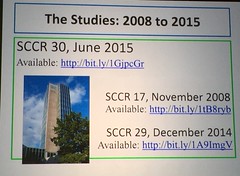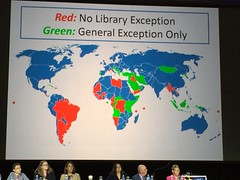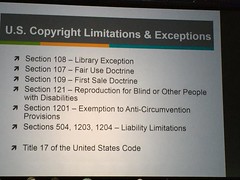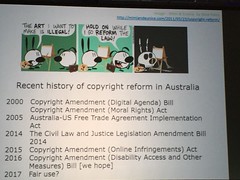Limitations and Exceptions for Libraries: The WIPO Study - Kenny Crews
Why copyright?
The scope of copyright is tremendously broad and its lasts for many, many years.
The mission of libraries relates to the mission of copyright.
- creation and dissemination on new creative works
- preserve and provide access to the full range of information services
 He has done three studies for WIPO [World Intellectual Property Organization]. (See photo) 2015 was an examination of exceptions that are in the law which related to the Berne Convention [Three step test, article 9(2)]
He has done three studies for WIPO [World Intellectual Property Organization]. (See photo) 2015 was an examination of exceptions that are in the law which related to the Berne Convention [Three step test, article 9(2)]188 member WIPO countries. 32 did not have specific library exceptions. 31 countries had general exceptions only, but not to specific activities.
Scope of exceptions:
- Preservation and replacement
- Private study and research
- Copy machines in the library
- Limitations in remembers
- Technological protection measures

- Who - libraries, archives, museums?
- What - published, unpublished? Articles, cull works? Music, movies?
- When - during the term of copyright protection? After?
- Why - conditions and proof?
- How - analog or digital?
Crews noted that the British model of copyright has impacted countries that were British colonies, even after they stopped being a colony. (The Imperial Statute Model)
In the US, we will in gaps of Section 108 (library exceptions) with Section 107 (Fair Use). Very few countries in the world have innovated their statutes related to library exceptions.
Innovations in Statutes: The European Union
- Orphan works directive, 2012
- Information society directive, 2001
- Expended provisions
- Copies for research and study
- Expanded technologies
- Digital preservation of unpublished works
- Digital access on dedicated terminals
- Orphan works directive
- MOU for out of commerce works (Memorandum of Understanding)
- Quotation right
- Incidental use
- Application to digital technologies
- Expansion of library services
- ILL
- Services to the visually impaired
- Mass Digitization for preservation
- Relationship to licenses
- Use of orphan works
- First sale and digital exhaustion of rights
- Cross-border delivery of works
The Statute of Anne (1710) - required delivery before publication of copies of books for the use of the Royal library, university libraries....
The public is the ultimate beneficiary of copyright law.
 List of exceptions (see photo)
List of exceptions (see photo)How is the US government helping in this area?
Key court cases are impacting libraries
- Kirtsaeng
- Hathitrust
- Georgia State
- House Judiciary Committee
US Copyright Office policy studies
The Executive Branch is also involved in advising the President on copyright policy
- Marrakesh Treaty has been sent to the Senate for ratification
Commerce Internet Policy Task Force
- did not recommend extending first sale doctrine to digital works
Work being done:
- IMLS Copyright Review project at University of Michigan
- Open educational resources
- Open ebooks initiative
A snapshot of what's happening now.
 Recent history of copyright reform (See photo)
Recent history of copyright reform (See photo)Copyright amendment - response to the Marrakesh Treaty
Improving access to materials for people with disabilities
Low hanging fruit (see photo) - not controversial
Ending perpetual copyright on unpublished works will - if passed - place millions of works in the public domain on the same day. They drew attention to this problem by digital recipes, placing them online and asking people to cook them! A radical act by librarians.
APA (Australian Publishers Association) and ALIA (Australian Library and Information Association) book cover agreement, August 1, 2016. Makes it easier for libraries to use book covers to promote books and authors. This was a cooperative approach and they hope to do more cooperation.
Their copyright act is over 700 pages. 41 minor amendments since 1996. Most exceptions are complex. Exceptions needed because they do not have fair use. They are in fair of expanding fair use. She believes they are closer than before of enacting something on fair use.
The Myanmar Experience - Ma Mya Oo
2015 - first democratic election after 50 years of military rule
New constitution, new courts, new trade agreements, new legislation
Current copyright law:
- Copyright Law of 1914
- Joined WIPO in 2001
- Have no Berne convention and no WIPO Internet treaties
- Have some regional and bilateral trade agreements
- No explicit library exceptions
- Fair dealing for private study, research, criticism, review
- Copying for certain educational purposes
- Terms of protection- life of the author plus 30 years
- No protection for foreign works
The future includes:
- Copyright education essential for librarians
- Librarians need to be involved in policy-making
The Polish Experience - Monika Mitera
She points their beginning with copyright law as being in the late 1400s.
Poland regained its independence in 1918. It's new copyright law was passed in 1926.
Copyright law of 1926
The core concept and basic assumptions shared with protection against unfair competition law. Copyright as a single, comprehensive right. Priority given to moral rights.
Poland had a positive impact on the Berne Convention.
The copyright law of 1952 was less friendly to authors.
Another copyright law replaced the 1952 version in 1994. Amended in 2002 and 2004. The amendment of 2004 (I think) affects libraries. Having had public consultations on copyright law since 2011.
Copyright act of 2015. Law was passed on Sept. 11, 2015. It still does not cover all libraries, since the wording is specific to education institutions.
What is the definition of a "copy"?
She quickly went through a number of slides, including slides on orphan works. Is a good faith search for the rights holder the same as a diligent search?
WIPO Regional Meetings - Eve Woodberry
- All issues discussed at the national level can impact WIPO. Since 2003, they have been focused on issues related to libraries.
- We need to educate ourselves about copyright, then educate our governments and lobby our governments.
- Finally, not everything is law or treaties. Look to develop partnerships.
No comments:
Post a Comment